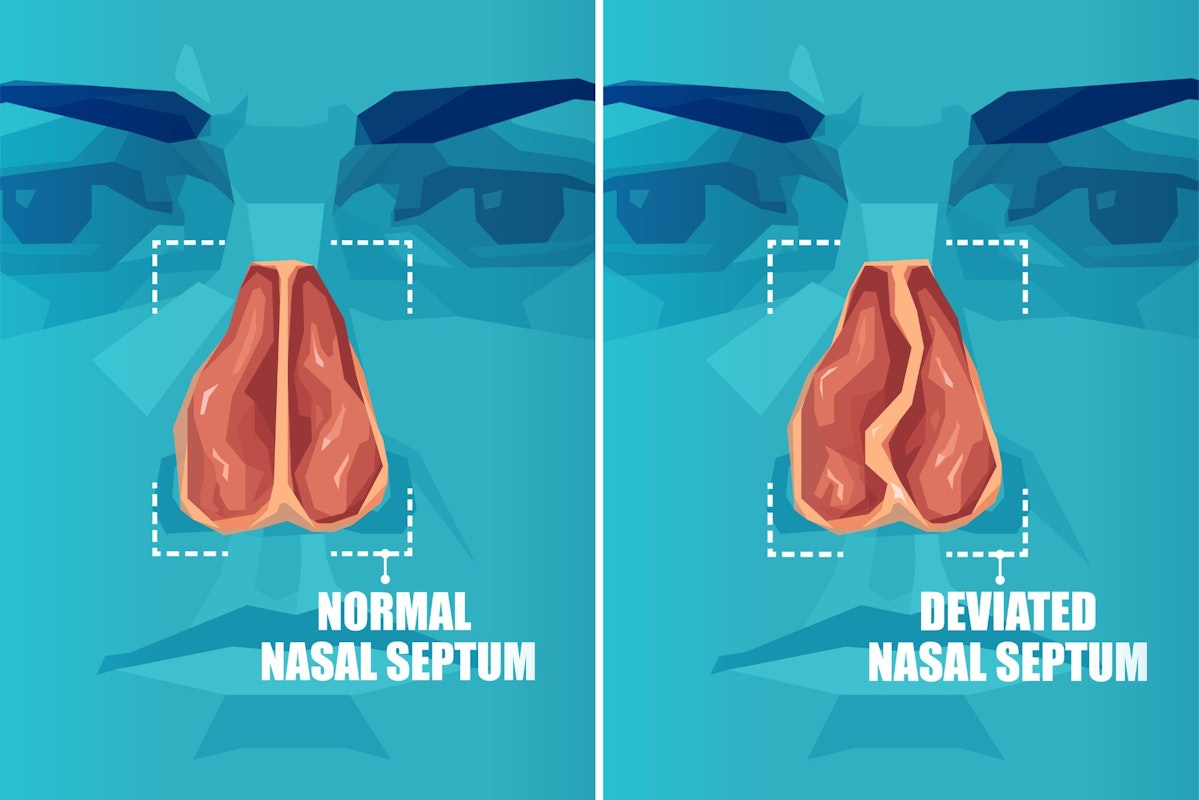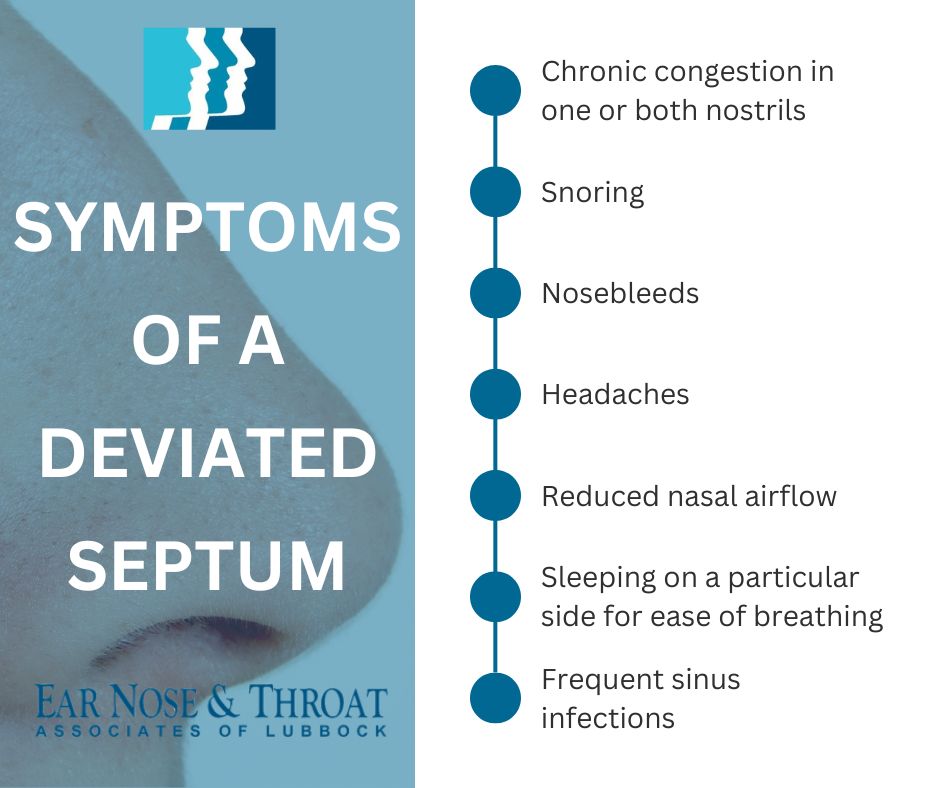A Surgeon Explains Deviated Septums & Sleep Apnea

A deviated septum and sleep apnea are two common medical conditions that affect your ability to breathe correctly. But are they related? Can a deviated septum cause sleep apnea?
The short answer is no, a deviated septum can’t cause sleep apnea. The long answer is still no, but it includes some important details about how a deviated septum can affect sleep apnea sufferers, even though it doesn’t cause their condition.
What Is a Deviated Septum?
The septum is the central wall in your nose that separates the nasal cavity into two sections: right and left. The front portion is made of cartilage, and the back is made of bone.
The septum should run straight down the center of your nose, but sometimes the bone in the back pushes the cartilage into an uneven position. This is what medical professionals call a deviated septum.

The deviation doesn’t always occur on just one side, either. Sometimes it affects both sides, with the septum protruding in one direction in the front and the opposite direction in the back.
Symptoms of a deviated septum include:
- Chronic congestion in one or both nostrils
- Snoring
- Nosebleeds
- Headaches
- Reduced nasal airflow
- Sleeping on a particular side for ease of breathing
- Frequent sinus infections
If your nose is visibly crooked and/or you’re experiencing some of the above symptoms, a deviated septum could be the cause. An ENT doctor can check for a deviated septum with a quick and painless exam, which includes visually inspecting your septum with a small light.

What Causes a Deviated Septum?
A deviated septum happens for various reasons, including the following:
- A congenital condition: It’s not uncommon for people to have a deviated septum from birth. It may result from a difficult birthing process or just a slight malformation of the nasal structure.
- Gradual growth and development: As your nose grows, your septum does too. Sometimes, it can grow unevenly to one side, perhaps if the underlying bone is slightly crooked. As the septum grows, the deviation becomes more pronounced.
- A nasal injury: Any trauma to the nose, like a sports injury, car accident, or a fall, can cause the septum to deviate.
What Is Sleep Apnea?
Sleep apnea is a medical condition where breathing stops and starts many times while you sleep. The most common type of sleep apnea is obstructive sleep apnea, in which your upper airway becomes blocked by throat collapse or by your relaxed tongue or tonsils falling backward into your airway.
After you stop breathing, you startle awake and your muscles regain their tone, opening your airway. Then you quickly fall back to sleep. Typically, people with sleep apnea don’t even realize they’re waking up dozens to hundreds of times throughout the night. They just feel exhausted in the morning.
All of this pseudo-waking is your body’s way of keeping you alive. However, sleep apnea still has some seriously harmful health effects:
- It prevents you from getting quality sleep: Constantly being startled awake at night prevents you from falling into a deep sleep or rapid eye movement (REM) sleep. As a result, you never truly get a full night’s rest, and you feel tired all the time.
- It decreases your body’s oxygen levels: Reduced oxygen levels strain your heart, lungs, and brain, ultimately shortening your lifespan.
- It reduces your overall quality of life: Not getting enough sleep is linked to health problems like obesity, diabetes, cardiovascular disease, and decreased immune function.
To help you breathe easier and get better sleep, an ENT doctor may recommend using a CPAP (continuous positive airway pressure) machine to keep your airway open while you sleep.
How Does a Deviated Septum Affect People Who Have Sleep Apnea?
So, how are a deviated septum and sleep apnea related?
People can have a deviated septum and sleep apnea simultaneously. And while a deviated septum doesn’t cause sleep apnea, it can exacerbate sleep apnea symptoms and make treatment more difficult.
A crooked septum causes turbulent airflow through the nose, potentially worsening throat collapse. Difficulty breathing through the nose also tends to increase mouth breathing, which can increase snoring and worsen sleep quality (for both you and your partner!). A deviated septum also makes you more susceptible to nasal congestion and sinus infections, which can worsen sleep quality and sleep apnea symptoms.
Will Fixing a Deviated Septum Improve Sleep Apnea?
If your ENT diagnoses you with a deviated septum, they might recommend a septoplasty, which is minor surgery to straighten the septum.
Straightening the septum will improve nasal airflow, but it won’t entirely cure sleep apnea. However, it will improve your nasal breathing during the day and potentially reduce your snoring and the turbulent airflow worsening your throat collapse at night.
It can also help you tolerate a CPAP machine better while you sleep, which makes an enormous difference in your sleep apnea symptoms.
What to Do if You Suspect a Deviated Septum or Sleep Apnea
While a deviated septum and sleep apnea are two separate medical conditions, they both cause disordered breathing — which no one wants.
If you suspect you have undiagnosed sleep apnea, it’s important to see a doctor. A simple sleep test will make things clear. Undiagnosed sleep apnea is dangerous, but a CPAP machine or other treatment option can change (and save) your life.
If you think you have a deviated septum, it’s also a good idea to see an ENT doctor, especially if you’re having trouble tolerating your CPAP machine. Suffering with a deviated septum is uncomfortable and can make symptoms of sleep apnea worse, but a diagnosis is quick and easy.
As we mentioned, straightening a deviated septum with a septoplasty won’t cure sleep apnea. But it will improve your breathing during the day, boost breathing during exercise, and potentially reduce disordered breathing at night.
Dr. Scolaro is a board-certified Otolaryngologist servicing the South Plains area. He has been practicing in Lubbock since 1990 and has earned a reputation as a skilled and experienced surgeon. He currently serves as the Medical Director for Covenant High Plains Surgery Center campuses, is a member of Covenant Health Partners and is an adjunct faculty professor for Texas Tech University Health Sciences Center School of Medicine. Learn more about Dr. Scolaro.
Categories:








